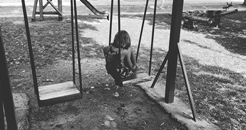 Relational poverty
Relational poverty
From an interview with Dr Bruce Perry
Dr Bruce Perry is a senior fellow of the Child Trauma Academy in Houston, Texas and a professor of psychiatry and behavioural sciences at the Feinberg School of Medicine in Chicago, Illinois. He recently co-authored a book with Oprah Winfrey called 'What Happened to You'. Here are excerpts from a wide ranging interview with Bruce:
We put way too much pressure on our young parents. Human beings are intended to parent with more adults around us, with the extended family model, where there's an auntie and an older cousin and the grandmother can jump in every once in a while to help. We're not biologically designed to meet the fundamental needs of multiple kids by ourselves. So, first, for parents, just be forgiving of yourself. Give yourself a little bit of a break. You need to get regulated (broadly speaking it means 'being in balance') too. I mean it's good for you to go to your exercise or take your walks or have your coffee with friends. That's not being selfish. That's actually allowing you to be your best for your child when they're in the home.
Everybody knows that when kids come home from school, the dumbest thing you could ever ask them is, "Do they have any homework?". Don't ask them. Feed them, give them a chance to get regulated, and then engage them. I think fun is the best way to learn things. I think kids keep telling us that when they find something that they enjoy. It's amazing what they can learn. So I am always happy to let them play, let them take the lead when it comes to acquisition of cognitive content.
One of the things that we're able to look at is the timing and the nature of bad things. It could be a loss of a parent, it could be abuse, it could be neglect and so forth. But we also looked at the timing and the nature of good things — relational health, connection to family, community and culture. And here's basically what we find: that if you have adversity, but you also have connections to family and community and culture, which are resilience building factors, you're not at any increased risk for bad outcomes. However, if you have adversity and the amount of adversities sort of outweighs the presence of relational connection, you have significant increase in risk.
And so this is where relational poverty is a really important thing. Do you know families that have no extended family nearby? They're not connected to their community of faith; they don't know their neighbours. That kind of social isolation puts you at tremendous risk for even minor adversity. If you have big adversity and then you have that relational poverty, that's when you're really at risk.
And, the ideal is, and this is why we really have been focusing a lot on building community, culture and connection to each other, is that we have a lot of relational health. Even with adversity, you end up being pretty healthy. And so in the end, the most powerful factors that determine how you function in the present are connections to others, positive connections. That is really is the major factor. Resilience is really is basically all about how you're connected. That's what we found; that's what a lot of other people that do this research have found. You don't have to have thousands of people that you're connected to.
Oprah talks about this a lot. She literally points to one teacher who saw her and understood how special she was, and who really was her lifeline. She provided resilience building experiences that set her on her life trajectory. And I think that's true for a lot of people. And the good news therefore, from my perspective is that every one of us out there can be that kind of person for somebody. You know, it may be your child or your nieces and nephews and maybe a neighbour kid, or it may be the kid you're coaching in sport. If you're a teacher, you're doing this all the time and you probably don't even realize you're literally creating life-saving, and life-transforming experiences for children, even in the little moments, the moments when you really are present with them.
One of the unfortunate things about our modern world is that we're so sensory overloaded with our phones and our appointments that even when we are around people, we don't slow down enough to give them that moment. People feel it when you see a colleague or a friend answer a text in the middle of a conversation. It's a completely different experience than when they're truly present and listening. I think that this is something that we can all do for the people around us, and if we can be better at doing that, the social fabric in our family and in our community will grow and become stronger. If you can put everything aside, and truly be with that person, and hear them, take a stance of curiosity, as opposed to a stance of judgment, you're going to make a huge difference in that person's life,
One of the most important resilience-building activities that you can do is music, the arts and sports. And the irony is, in educational environments, all too often we view those as add-ons, sort of as electives. But the truth is, if you really understand how the brain works, you'll recognize that the best way to make somebody available for high-quality academic achievement is to give them episodic regulatory opportunities for resilience-building through sport, through music, through creative arts, through performance arts. Those things should be absolutely core to high-quality academic curriculum.
Retweet about this article:
From an interview with Dr Bruce Perry, 04/08/2021